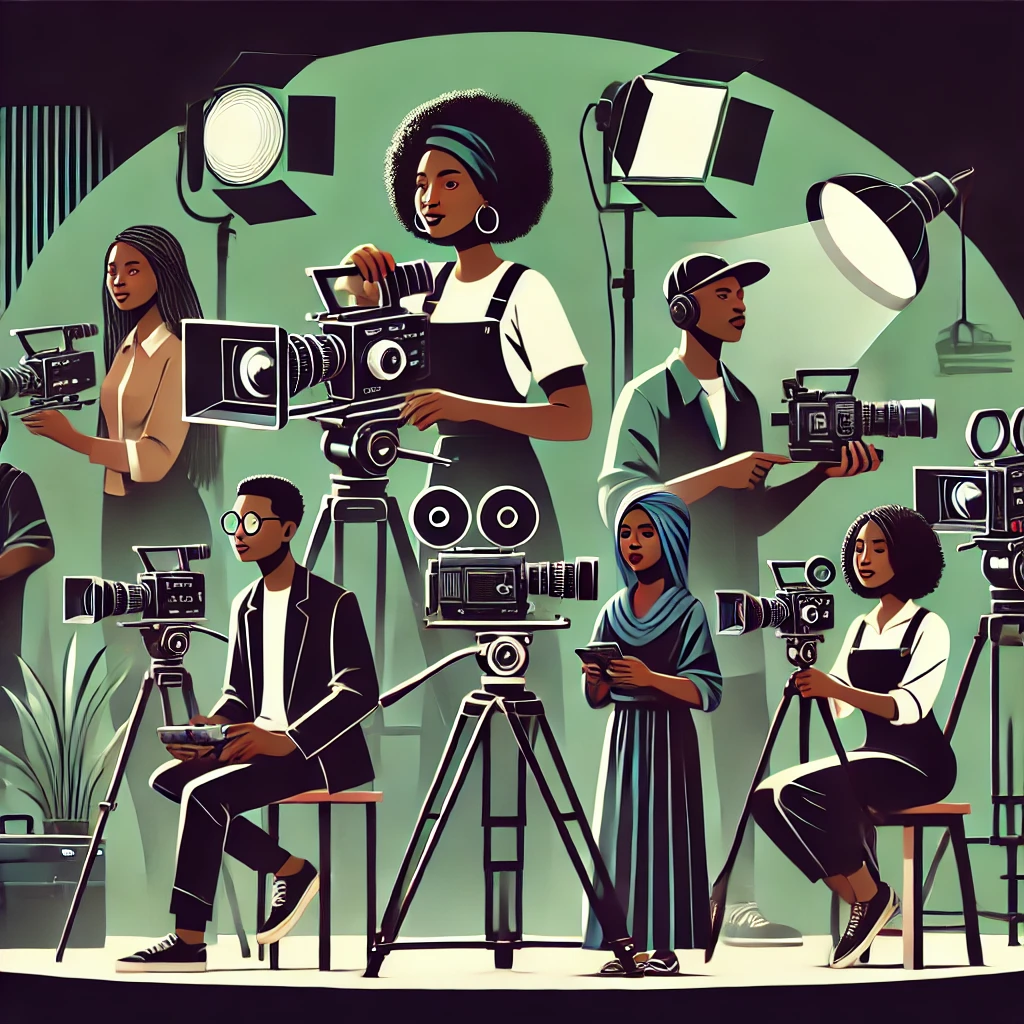Introduction: The Digital Revolution in Filmmaking
Imagine a world where creating a film is no longer a privilege reserved for those with massive budgets and extensive technical knowledge. This is the world digital cameras have created – a landscape where creativity trumps expensive equipment, and storytellers from Lagos to Los Angeles can bring their visions to life with unprecedented ease.
The journey of digital cameras in filmmaking is more than just a technological evolution; it’s a narrative of democratization, innovation, and artistic liberation. Nowhere is this more evident than in Nollywood, Nigeria’s vibrant film industry, which has embraced digital technology as a catalyst for growth and global recognition.
The Shift
Before digital cameras, filmmaking was an expensive, complex process. Celluloid film was costly, required specialized equipment, and demanded extensive technical expertise. Each minute of footage represented a significant financial investment. Mistakes were expensive, and experimental filmmaking was a risky endeavor.
Digital cameras changed everything. They transformed filmmaking from an exclusive art form to an accessible medium, particularly for emerging markets like Nollywood. The barriers to entry dramatically lowered, allowing more diverse voices to tell their stories.
Why Are Digital Cameras Essential for Filmmaking?
Digital cameras aren’t just tools; they’re storytelling enablers. They offer:
- Exceptional Image Quality: Modern digital cameras can capture images with stunning clarity, often rivaling or surpassing traditional film.
- Adaptability: From dark indoor scenes to bright outdoor landscapes, digital cameras can adjust settings in real-time.
- Rapid Post-Production: Footage can be immediately imported, edited, and distributed, dramatically reducing production timelines.
Nollywood’s growth is a testament to digital camera technology. Where once the industry was limited by expensive equipment, now filmmakers can produce high-quality content with relatively modest investments. Digital cameras allowed Nigerian filmmakers to:
- Produce more content
- Experiment with storytelling
- Reach international audiences
- Compete on global platforms
Types of Digital Cameras in Filmmaking
1. DSLRs and Mirrorless Cameras
These compact cameras have become darlings of indie filmmakers. Originally designed for photography, they’ve found significant filmmaking applications.
Pros:
- Affordable
- Lightweight and portable
- Interchangeable lenses
- High-quality video capabilities
Cons:
- Limited professional video features
- Potential overheating during long shoots
- Less robust than dedicated cinema cameras
Popular models like the Canon EOS series and Sony Alpha line have been used in numerous independent productions, proving that great storytelling isn’t about expensive equipment but creative vision.
2. Cinema Cameras
The heavy-duty workhorses of professional filmmaking, cinema cameras represent the pinnacle of digital filmmaking technology.
Brands like ARRI, RED, and Blackmagic Design produce cameras with:
- Massive sensors capturing incredible detail
- High dynamic range
- Customizable color profiles
- Professional audio and monitoring options
In Nollywood, cinema cameras have been instrumental in elevating production values. Films like “King of Boys” and “The Wedding Party” showcase how these cameras can transform visual storytelling.
3. Camcorders
Often overlooked, camcorders remain valuable for specific filmmaking scenarios:
- Documentary production
- Event coverage
- Quick, run-and-gun shooting styles
Their integrated design with built-in audio and stabilization makes them ideal for certain project types.
4. Action Cameras
GoPro and similar action cameras have revolutionized how we capture motion and extreme scenes:
- Ultra-compact
- Incredibly durable
- Capable of mounting in impossible locations
- 4K video capabilities
Nollywood filmmakers have creatively used these for dynamic chase scenes and unique perspective shots.
5. Smartphone Cameras
Perhaps the most democratizing technology, smartphone cameras have become serious filmmaking tools. With 4K recording, advanced stabilization, and professional editing apps, phones like the iPhone have been used to create entire feature films.

Factors to Consider When Choosing a Digital Camera
Selecting the right camera isn’t just about specs – it’s about matching technology to your creative vision:
- Budget: From smartphone-based productions costing nothing to cinema cameras worth hundreds of thousands of dollars
- Film Style: A horror film might require different camera characteristics compared to a romantic comedy
- Technical Requirements: Consider sensor size, frame rates, and lens compatibility
- Portability: Crucial for Nollywood’s diverse shooting locations, from bustling cities to rural landscapes
Nollywood: A Digital Camera Case Study
Technological Leap
Exploring how digital cameras transformed Nollywood’s production landscape, comparing technological adoption rates with Hollywood and Bollywood.
Filmmaker Perspectives
Interviews and insights from Nollywood directors and cinematographers discussing their digital camera experiences.
The Future of Digital Cameras in Filmmaking
Emerging technologies promise even more exciting developments:
- AI-assisted shooting and editing
- Virtual production techniques
- 8K and potentially 16K resolution capabilities
- Enhanced low-light performance
For Nollywood, this means continued technological leapfrogging, potentially becoming a global leader in innovative filmmaking techniques.
Conclusion: Beyond Technology, Towards Storytelling
Digital cameras are more than technological tools – they’re storytelling enablers. They represent a global democratization of creative expression, allowing voices from every corner of the world to share their narratives.
For Nollywood and filmmakers worldwide, the message is clear: Your story matters, and now, more than ever, you have the tools to tell it.
FAQs
Q: What’s the absolute best camera for a beginner filmmaker? Start with what you have. Your smartphone, a basic DSLR, or a mirrorless camera can be your first step. Master storytelling techniques before investing in expensive equipment.
Q: How important are technical specifications really? Technical specs matter, but storytelling is paramount. A compelling narrative shot on a smartphone will always be more engaging than a technically perfect but boring film shot on a cinema camera.
Q: Can Nollywood compete globally with digital camera technology? Absolutely. Digital cameras have leveled the playing field. With creativity, technical skill, and compelling storytelling, Nollywood filmmakers can and are competing on the global stage.
Q: How often should I upgrade my filmmaking camera? Focus on your skills, not your gear. Upgrade when your current equipment genuinely limits your creative vision, not just because a new model is released.















Leave a comment